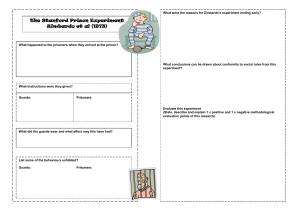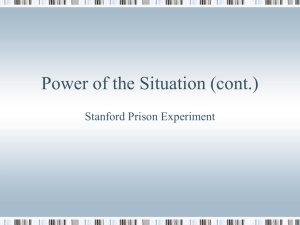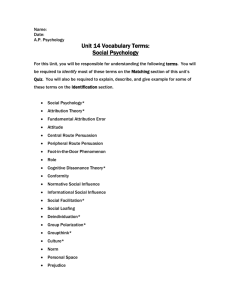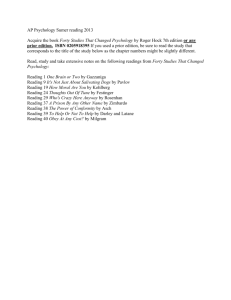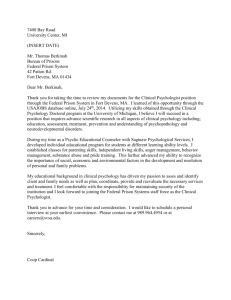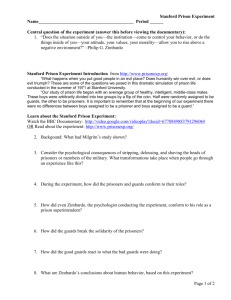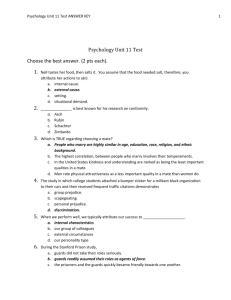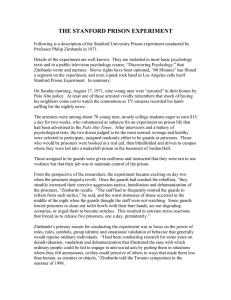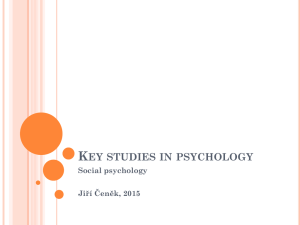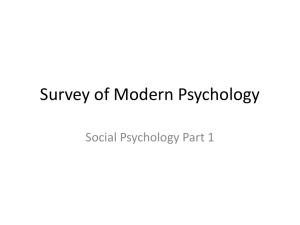File
advertisement
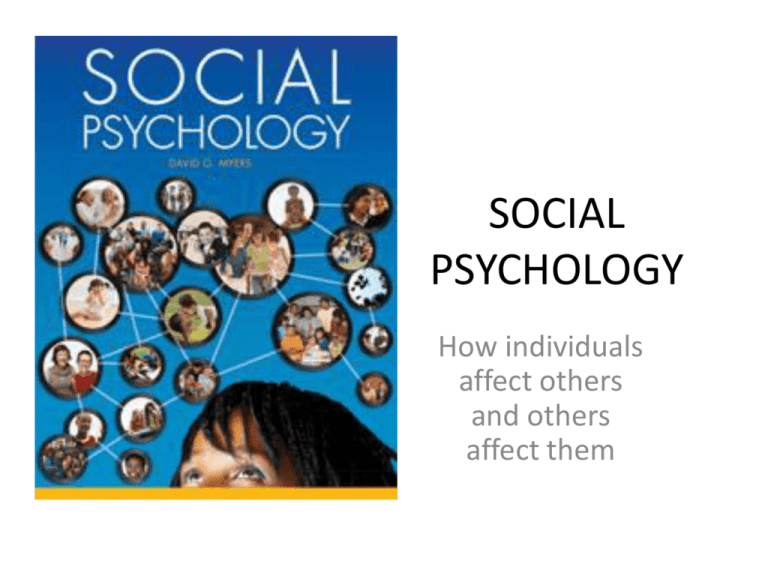
SOCIAL PSYCHOLOGY How individuals affect others and others affect them What are some of the interpersonal dynamics in the movie Mean Girls? What is social psychology? • Social psychology studies individuals in the social context. • It is the study of how and why people think, feel, and do the things they do depending upon the situation they are in and who else is involved. Sociology vs Social Psychology • Sociology focuses on group factors such as race and socioeconomic class • Whereas social psych focuses on the individual (within those groups) Are these behaviors normal? • Create this chart in your notes (use a FULL page): Behavior Picking nose Heavy makeup Personal space Weird handshake Clothes backwards Facing sideways or backwards in elevator Eating with hands Context when this behavior is NORMAL Context when this behavior is NOT NORMAL Interpersonal space Norm Reform – Violating social norms • This social psychology project will involve going out in public and violating a norm (perform an unexpected behavior) • You will do this consistently/follow a procedure – Ex: always break into line in front of 3rd person at MacDonald's • Compare reactions in 2 different neighborhoods, ex: – Inglewood vs Beverly Hills – Mexican vs Black neighborhood • You must be systematic (scientific) and document, analyze and present results Read over your project planning sheet – Choose your group. Max 4. – Think about a norm you want to violate in public. – Presentations in 2 (or 3?) weeks. – Complete planning sheet today. Norm • Something that is usual, typical, or standard. • A standard or pattern, esp. of social behavior, that is typical or expected of a group – Ex: saying thank you after being served food – Ex: facing the front when in an elevator Scientific method Project time Homework, due next class • Complete white portion of worksheet on conformity, obedience, deindividualization and the bystander effect. Leave shaded portion for completion in class. College level reading • 323 to 346 • Potential reading quiz soon… Time: Deindividualization • What happens when you remove individual responsibility or identity from a group? • One a sheet of paper, write a list of all the things you would do if you were invisible for a day. No swearing please! Group role plays • In your groups, look up your assigned research or phenomenon – Act it out – Then, clearly define the concept – Thoroughly cover any key aspects of this phenomenon • 6 groups – – – – – – Conformity Obedience Bystander effect Deindividualization Persuasion – 2 groups Peer review: Norm Reform Planner • Page 1 – give 4 points if driving question, norm definition, table and 4 bullet points at bottom are complete. Reduce points accordingly if parts are missing. • Page 2 - 6 points – Norm violated is clearly stated on top of page or in hypothesis – All boxed fully completed – DV (reactions) are visible and measurable and NOT vague Friday – watch Mean Girls! • Watch the first 40 minutes of this awesome movie to see social psych concepts in action! • Stanford University has a summer class that analyzes this movie for it’s social psychology – – – – – Groups Conformity Persuasion/influence Obedience Norms • Answer Q’s on worksheet provided Prison • Write down 5 words that you associate with prison, prisoners and the justice system Stanford Prison Experiment • Philip Zimbardo • 1971 • Simulated prison environment • Random assignment of guard or prisoner role • Insight into human nature – how people will easily be cruel to others they see as inferior to themselves After the documentary • Move to different tables for discussion questions • Share out – discussion • 5 min table talk, 5 min share out • Link: https://www.youtube.com/watch?v=L_LKzEql Pto Experimental design analysis • Using hindsight, what might you have done differently than Zimbardo? • Would you qualify the experiment as a success? Why or why not? • Should anyone be held accountable for lasting psychological damage that resulted from this experiment? Write a paragraph summary about SPE • Describe this research and what was learned from it in your own words. SPE - Summary The Stanford prison experiment (SPE) was a study of the psychological effects of becoming a prisoner or prison guard. The experiment was conducted at Stanford University from August 14–20 1971, led by psychology professor Philip Zimbardo. It was funded by/of interest to both the US Navy and Marine Corps as an investigation into the causes of conflict between military guards and prisoners. Twenty-four male students were selected to take on randomly assigned roles of prisoners and guards in a mock prison situated in the basement of the Stanford psychology building. The participants adapted to their roles well beyond Zimbardo's expectations, as the guards enforced authoritarian measures and ultimately subjected some of the prisoners to psychological torture. Many of the prisoners passively accepted psychological abuse and, at the request of the guards, readily harassed other prisoners who attempted to prevent it. The experiment even affected Zimbardo himself, who, in his role as the superintendent, permitted the abuse to continue. Two of the prisoners quit the experiment early and the entire experiment was abruptly stopped after only six days. http://www.prisonexp.org/ • Spend some time on the official SPE site to learn more
